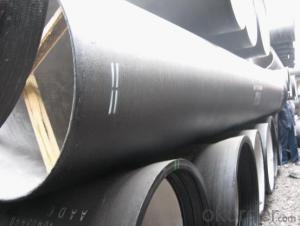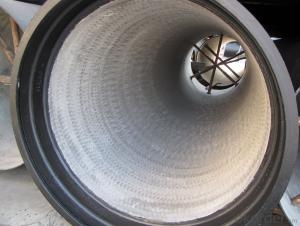Ductile Iron Pipe DN80 DN100 DN200 K8 K9 K7
OKorder Service Pledge
Quality Product, Order Online Tracking, Timely Delivery
OKorder Financial Service
Credit Rating, Credit Services, Credit Purchasing
You Might Also Like
Specifications
Quick Details
| Place of Origin: | China (Mainland) | Brand Name: | CMAX | Model Number: | T type / K type / Flange type |
| Length: | 6m / 5.7m / Negotiable | Standard: | ISO2531 / EN545 / EN598 | Application: | Potable / Sewage water |
| Diameter: | DN80~DN2200 | Shape: | Round | Hardness: | 230 |
| Pipe Wall Thickness: | standard | Pull Strength: | 420 | Yield (≥ MPa): | 300 |
| Material: | Ductile Iron | Type: | Centrifugal ductile cast iron pipe | Certification: | ISO2531 / EN545 / EN598 |
| Outer Diameter: | 80-2200 | Thickness: | standard | Specification: | DN80~DN2200 |
| |
The advantages to the customer:
Trustworthy financial strength.
One-stop shopping.
Fast and efficient service.
Coordination of shipments from multiple plants.
Specialists of the overseas shipping process.
A more competitive price.
- Q:Are ductile iron pipes suitable for trenchless pipe bursting methods?
- Yes, ductile iron pipes are suitable for trenchless pipe bursting methods. They have the necessary strength and flexibility to be effectively burst and replaced without the need for extensive excavation.
- Q:Can ductile iron pipes be used for underground chemical transport systems?
- Due to their strength, durability, and resistance to corrosion, ductile iron pipes are commonly utilized in a variety of applications. However, when considering their use in underground chemical transport systems, it is crucial to take certain factors into account. Firstly, it is necessary to evaluate the type of chemicals being transported. Although ductile iron pipes are generally resistant to a wide range of chemicals, including acids, alkalis, and organic solvents, there are some chemicals that can cause corrosion or react with the iron content of the pipes, leading to degradation and potential leakage. Therefore, it is essential to assess chemical compatibility and seek advice from chemical engineers or experts to determine if ductile iron pipes are suitable for specific chemical transport applications. Secondly, the concentration and temperature of the chemicals must be considered. Elevated temperatures and high concentrations of certain chemicals can accelerate the corrosion process, potentially compromising the integrity of the pipes. Therefore, it is crucial to evaluate the operating conditions and ensure that the ductile iron pipes can withstand the chemical concentration and temperature levels. Furthermore, the potential presence of abrasive or erosive chemicals needs to be taken into consideration. If the transported chemicals contain abrasive particles or possess erosive properties, it may cause increased wear and tear on the inner surface of the pipes, reducing their lifespan and potentially leading to leaks. In such cases, it may be more appropriate to use alternative materials with higher resistance to abrasion or erosion. Lastly, it is important to adhere to relevant regulations and standards. Different countries or regions may have specific requirements for underground chemical transport systems, including the selection of materials. Therefore, it is crucial to ensure that ductile iron pipes meet the necessary standards and are approved for use in such applications. In conclusion, while ductile iron pipes have many desirable properties for various applications, including underground use, their suitability for chemical transport systems is dependent on several factors. Before deciding to use ductile iron pipes for underground chemical transport systems, it is essential to carefully evaluate chemical compatibility, concentration and temperature levels, the presence of abrasive or erosive chemicals, and compliance with regulations. Seeking guidance from experts in the field is highly recommended to ensure the safety and effectiveness of the chosen piping material.
- Q:How much is the working pressure of ductile iron pipe used in water supply pipe and how is MPa determined?
- Upstairs are positive solutions, but now outdoor buried water pipes are using steel wire mesh skeleton, plastic composite pipe instead of ductile iron pipeThe general pressure grades used for water supply pipes are 1.0MPa and 1.6Mpa
- Q:Can ductile iron pipes be used for stormwater drainage systems?
- Yes, ductile iron pipes can be used for stormwater drainage systems. Ductile iron pipes are known for their strength, durability, and resistance to corrosion, making them suitable for various applications including stormwater drainage. These pipes can efficiently handle the high flow rates and heavy loads associated with stormwater runoff, making them a reliable choice for such systems.
- Q:Ductile iron pipe in the direction of it?
- The utility model is mainly used for conveying water, and is an ideal choice for tap water pipes.
- Q:Can ductile iron pipes be used for underground steam distribution systems?
- Yes, ductile iron pipes can be used for underground steam distribution systems. Ductile iron has excellent strength, durability, and resistance to high temperatures, making it suitable for carrying steam underground. Additionally, its corrosion resistance properties ensure a longer lifespan and reduced maintenance costs.
- Q:What are the differences between cast iron pipes W and A?
- Type W: combination of both advantages of the connection type A interface has the advantages of high strength and convenient installation, because of the use of W type straight pipe and reduces the material cost and can be coupled with the design structure of the B type pipe is more compact than the A type pipe, saving installation space.
- Q:How can the ductile iron pipe be welded?
- Welding cast iron is mainly in three aspects: carbon control, stress elimination, structural adjustment. You can choose better welding materials, such as WE777 and other imported welding materials. Crack resistance is very good. In addition, the sewing process can be adopted in the structure to increase the stability of the welding effect. You can learn more about WE777 welding applications.
- Q:Can ductile iron pipe be used for desalination plants?
- Certainly, desalination plants can utilize ductile iron pipe. Ductile iron, a robust and enduring material, has found extensive application across various industries, notably in water and wastewater treatment facilities. It boasts exceptional resistance against corrosion, remarkable tensile strength, and the ability to withstand external loads and pressures. Consequently, it proves ideal for conveying water and other fluids within desalination plants, where the presence of high salt concentration and other corrosive elements prevails. Furthermore, ductile iron pipes are renowned for their prolonged service life and minimal maintenance demands, rendering them advantageous to desalination plants that operate continuously and necessitate a dependable and efficient piping system.
- Q:What is the expected fatigue life of ductile iron pipes under cyclic loading?
- The fatigue life of ductile iron pipes under cyclic loading can vary due to factors such as the magnitude and frequency of the loading, material quality, pipe design and installation, and environmental conditions. Ductile iron possesses high strength and ductility, enabling it to withstand cyclic loading to a certain extent. However, like any material, it is susceptible to fatigue failure over time. Engineers commonly employ fatigue analysis and testing methods to estimate the expected fatigue life of ductile iron pipes. These methods involve subjecting representative samples of the pipes to controlled cyclic loading and determining the number of cycles required for failure. The results of these tests can then be used to extrapolate the expected fatigue life of the pipes under similar loading conditions. It is important to note that the expected fatigue life can significantly differ depending on the specific conditions and loading patterns experienced by the pipes in a given application. Therefore, it is crucial to consider operational demands, maintenance practices, and the overall structural integrity of the pipeline system. Additionally, adhering to appropriate design standards and guidelines, along with regular inspection and maintenance, can help enhance the fatigue life of ductile iron pipes. In conclusion, while providing a specific value for the expected fatigue life of ductile iron pipes under cyclic loading is challenging, engineers can estimate it through fatigue analysis and testing methods. Considering various factors and maintaining the pipes properly is essential to ensure their longevity and prevent potential failures.
1. Manufacturer Overview |
|
|---|---|
| Location | |
| Year Established | |
| Annual Output Value | |
| Main Markets | |
| Company Certifications | |
2. Manufacturer Certificates |
|
|---|---|
| a) Certification Name | |
| Range | |
| Reference | |
| Validity Period | |
3. Manufacturer Capability |
|
|---|---|
| a)Trade Capacity | |
| Nearest Port | |
| Export Percentage | |
| No.of Employees in Trade Department | |
| Language Spoken: | |
| b)Factory Information | |
| Factory Size: | |
| No. of Production Lines | |
| Contract Manufacturing | |
| Product Price Range | |
Send your message to us
Ductile Iron Pipe DN80 DN100 DN200 K8 K9 K7
OKorder Service Pledge
Quality Product, Order Online Tracking, Timely Delivery
OKorder Financial Service
Credit Rating, Credit Services, Credit Purchasing
Similar products
New products
Hot products
Related keywords



























